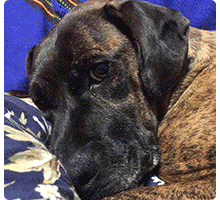 White Cloud at 13, June, 2009
White Cloud at 13, June, 2009The National Buffalo Museum in Jamestown, North Dakota, has cornered the market on white bison. On July 10, 1996, the day before Phoebe was born, a tiny albino calf was born in Michigan, North Dakota. She's a vanishingly rare creature, and she was named White Cloud. White Cloud went on to become a mother many times over. She threw four brown calves, and then in 2007 the impossible happened again: a white bull calf, Dakota Miracle, was born that August.
But the saga isn't over by any means. In May 2007, one of the Buffalo Museum's brown cows threw another white calf, and this one is named Dakota Legend. This is the only photo I was able to get of all three white bison in the same frame. It's tough when you're behind a 9' chain link fence. Dakota Legend is the calf in the foreground, with his brown mama. That's White Cloud in the middle, and Dakota Miracle following her.

It seems obvious to a Science Chimp that some of White Cloud's progeny must be involved in line breeding for albino bison. As in: This three-bison amazement is likely not the natural accident you might think it is. I'm guessing that a number of the wild type brown bison in this small herd of 30 may carry genes for albinism at this point. And being a recessive gene, both parents must carry it. The herd is maintained by the North Dakota Buffalo Foundation, and they have 200 acres of nice pasture to roam on both sides of Interstate 94. I honestly don't know if they're line breeding, but leaving a bunch of sorta related buffalo together who happen to carry genes for albinism is one way to get more white calves. And white calves bring the tourists in.
 If I had to pick whether I wanted to be a normal brown bison or a white one, I'd pick A.
If I had to pick whether I wanted to be a normal brown bison or a white one, I'd pick A.Melanin, it turns out, is a wonderful thing. It helps with vision and hearing. Animals that lack melanin in their eyes and ears can have very poor eyesight and hearing. This is why Dalmatians and even Boston terriers born with white ears can be deaf. Without the strengthening structure of melanin, eyes and ears don't work too well.
So white bison are a bit squinty, because the sun hurts their eyes. Make that quite squinty.
To be fair to the albino animals, no bison look their best in June, because that's when they shed their winter hair. This is Dakota Miracle, White Cloud's son. He'll be a wonderful bull someday! He's well on his way to magnificence.

The red stains are probably caused by yeast--you see them around the eyes and ears of white dogs all the time.
 It does make you want to get in there and give them a good currying, though. Thing is, they wouldn't enjoy it, and neither would I. So I guess they'll just have to look scurfy until fall.
It does make you want to get in there and give them a good currying, though. Thing is, they wouldn't enjoy it, and neither would I. So I guess they'll just have to look scurfy until fall.Tomorrow, I'll tell you about Liam and the white bison.






2 comments:
I'm guessing, given the tremendous importance of Bison to so many Native American and (in Canada) First Nations cultures, that something as rare as a white bison has special spiritual significance.
A true white bison, not an albino, was born on the Heider farm near Janesville, WI in 1994. Her name was Miracle, and she was the first white bison since 1933. She was considered sacred by Native Americans, and thousands came to visit her. As she grew, her coat changed from white to black to red to yellow. It was a big news story.
Post a Comment